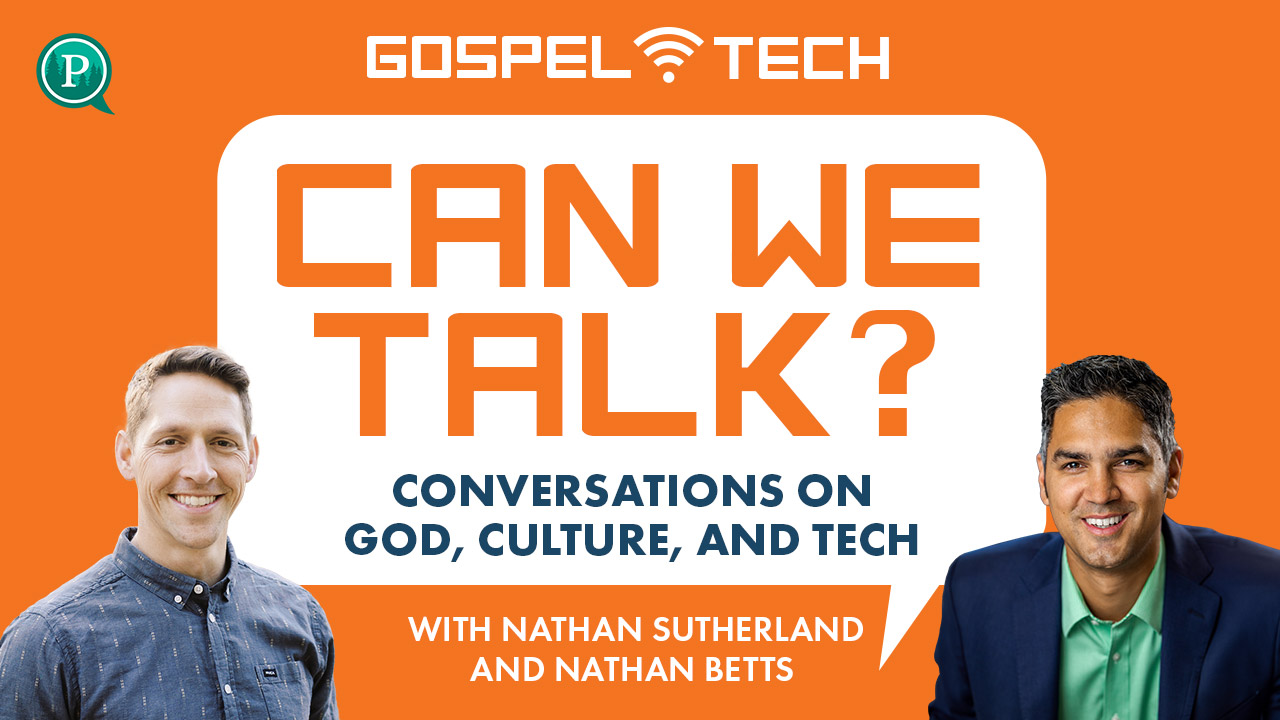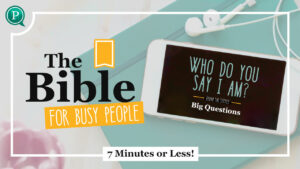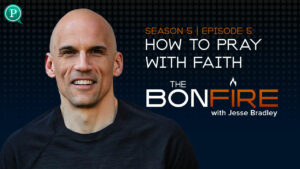God matters today. Many of us believe that, but we need to connect that truth to our daily lives in a world filled with frenetic goal chasing, instant gratification technology, and the many fears being shouted from every digital rooftop. Today’s conversation focuses on how God fuels the most important conversations and solutions to the problems of our day.
🔗 click the link in the profile
🎧 search Gospel Tech in your favorite streaming service (iTunes, Amazon)
Transcription:
Nathan Sutherland:
Hello, everyone, and welcome to the Gospel Tech podcast. My name is Nathan Sutherland, and this podcast is dedicated to helping families love God and use tech. Today, we are in episode four of the Between Two Nathans, or the Nathan and Nathan podcast, or whatever we end up calling this. I do apologize, we have recorded multiple of these, and still have no firm ground on the name. But we’re excited to talk with you today. Joining us is Nathan Betts.
Nathan Betts:
Hey.
Nathan Sutherland:
We are going to continue this conversation. So far, we’ve had our introduction. We’ve talked about culture in the big picture and this idea of modernism and postmodernism. Then we talked about technology. Today, we’re jumping into the God side of the culture, God and technology, and we are talking about, why is God relevant? Kick this conversation off for us. When we were talking about, why is God relevant, where should we begin? Because that’s a huge question, and we don’t just want to stay up in the clouds. We want to bring this practical for our listeners.
Nathan Betts:
I think we have to start with the purpose question, because if we don’t at some point touch on what we were made for, then, of course, when we talk about any stream of technology, it’s going to almost feel like, “Hold on, this isn’t a religious question. This isn’t a faith question. This is not a Christian question. I’m just on this gadget or device, and what does faith have to do with this?” When we’re asking that question, it always comes back to, we have to figure out, what were we made for? Because if we actually become clear on that, then we’ll become clear on, “Oh, maybe faith is irrelevant here,” or, “Actually, no, maybe it’s actually profoundly relevant.” We only get to that if, of course, and this is a big if, because many people might say, “Well, I don’t believe that God did make me,” but fundamental to Christian belief is the fact, is the understanding that God, the uncreated one, the triune God, has made us. Now, if that is true, and orthodox Christianity would say resoundingly yes, it is true, then we need to figure out, what has He made us for?
Nathan Sutherland:
Then, let’s start there. When we talk God, we are speaking specifically God of the Bible as set down by the Bible. This is divine revelation coming through written words, vetted and tested through canonical history, and brought to us as what we know today as the Christian faith. If someone’s like, “Hey, I don’t even believe there is a God,” we’re not necessarily addressing that conversation today on, how can we prove God? We’re saying God is revealed through scripture and history as truth, capital T. Is that a fair spot to start?
Nathan Betts:
Yes. We can go down that whole route another time, thinking, how do we know God exists? But I think for all intents and purposes here, insofar as this conversation is concerned, yeah, we’re assuming God exists, and he’s trustworthy, and he’s revealed himself to us through the Word, through Jesus himself. And that’s the God we’re talking about.
Nathan Sutherland:
Then in that, we go, “How is that God?” Yes, the big picture of God, how is a power bigger than humans important and relevant, sure. But in this case, we’re going to answer that question by saying, “Hey, there is truth, and we know him as Jesus, and in light of that, why is that relevant for us?” You had done a run-up for that, but I just wanted to say, for our listeners, if you’re not here as a believer in Christ, know that that’s where we’re giving these answers from.
Nathan Betts:
Yes.
Nathan Sutherland:
We’d love to take those tangents, but for the greater listening good, this is how we focus the conversation, so it’s not a 10-part series to answer one intro question.
Nathan Betts:
Okay, so let’s get right to it. This is an example, I think I’m borrowing images and examples from someone else here, but years ago I remember hearing this, so I’m just going to use it and take it as my own here. Imagine with me, if you will, we are at a coffee shop. We order a charcuterie board, so the meats, cheeses, the finest meats and cheese, prosciutto, smoked cheese. Anything that is lovely to the European palette, it’s being brought out to us in a matter of minutes. Then eventually, they finally do bring it to us. When they bring it to us, they not only bring it to us, they bring it to us, and under all these lovely meats and cheese is the board, the board itself. But the board this time is not wooden, it’s an iPad, a shiny new iPad. Now, part of us would think, well, this is interesting, but eventually for those of us who know even a little about the iPad, we would know, hold on a second. That is not what this thing was made for. It was not to be a meat and cheese board.
Nathan Sutherland:
Would it have an app of a wooden board underneath it, that it would at least look like a charcuterie board for me? I’m trying to picture this in my head.
Nathan Betts:
Maybe.
Nathan Sutherland:
Okay, all right.
Nathan Betts:
That would be pretty fancy.
Nathan Sutherland:
Yeah, it’d be very fancy. I’d have a screen protector on it. But they bring this to us and it’s got meat and it’s got cheese and it’s got delicious, but it’s on an iPad.
Nathan Betts:
And the knife is there. So all of a sudden the person there, they come out and they start cutting bread on top and we’re thinking, no, no, no, because we know that is not what the iPad was made for. We know that actually it wasn’t intended to actually hold food. It was meant to do other computing purposes. And we can go down there.
Nathan Sutherland:
And it’s a massive waste to shatter the screen with one of those little cheese knives.
Nathan Betts:
I think this is why in a big way we ask, what’s interesting about the purpose question is, we ask this about so many other things. We ask this about phones. We’re like, “What can this thing do?” But interestingly, we’re not as good, I think, at asking some of them. Yeah, maybe we might think about, oh, those are really academic or metaphysical questions, but it’s very practical to ask the question, what was I made for? Because if we don’t get that thing, we get the whole of life wrong. Okay, where do we go from here? Because that’s a massive question. I would want to zoom in on one of the early church fathers, Augustine. In his Confessions, his book Confessions, I think it’s the first page of that book, he writes about God. He writes, speaking of God there, “You have made us for yourself and our hearts are restless until they find the rest in you.”
Augustine is making a claim that has, as I mentioned earlier, echoed throughout the centuries, but corresponded to Christian belief, which is we are not our own. Contrary to other perspectives or worldviews, we didn’t just come through random chance. We actually have been made by a loving God. Therefore, we have a purpose. But what Augustine is saying there is, actually, you not only made us, full stop. No, actually, he didn’t even say that. “You have made us for yourself.”
Nathan Sutherland:
Which is this is what the New City Catechism would put it.
Nathan Betts:
Yeah, go ahead.
Nathan Sutherland:
You are designed by God to know him and to glorify him, and then Paul writes in Ephesians 2:10 that this really is the good works that we are called to do, to love God with our heart, soul, mind, and strength. So you’re saying we’re like iPads being served as charcuterie boards if we’re not being deliberate when we say, why is God relevant? Because we can be misused. We can find our purpose in the wrong things, and either those things are bad, actually doing harm to ourselves or others, or they’re just useless, that they’re not the good works God’s calling us to. Is that fair?
Nathan Betts:
Yes.
Nathan Sutherland:
Okay.
Nathan Betts:
Do you want me to say this?
Nathan Sutherland:
No. I wanted to make sure I summed that up.
Nathan Betts:
No, that’s it.
Nathan Sutherland:
And hearing you share that, I was like, “Oh, that’s the beauty of catechism, by the way.” Listeners, if you don’t know the New City Catechism, check it out. It’s a wonderful way to get biblical truth summed up. But then you were saying.
Nathan Betts:
Yeah, so if we just continue down that trail, okay, Augustine’s words, “You, God, have made us for yourself and our hearts are restless until we find a rest in you,” he’s saying also something of a human experience. He’s not just making a theological claim of who God is. He’s making, what would I say, not to get too technical, but he’s making an anthropological claim. He’s saying something of what it means to be human.
Nathan Sutherland:
Anthropological.
Nathan Betts:
He’s saying not only this is something of who God is, this is also saying something of who you are meant to be as human beings. That’s something he’s saying. This is something of who we are as human beings, and what does that mean? It means that actually we are on the search. We have been built since we’ve been made by God, that language really has spread throughout the whole of scripture, I think of Psalm 139, fearfully and wonderfully made, handmade. Then we’ve got to figure out says, Augustine, we’ve got to figure out how to get to God. Now, the great news about that, as we know, it wasn’t really an issue of getting to God as much as God has come to us, but here is where we get to technology. If that is the case, then we ask not only of technology, but we have to ask of everything, is this thing, over here, whatever in this case, is this app, is this social platform, is this device, in the time that I’m spending with this thing, is it leading me to Christ?
Is it pushing me towards not only Jesus but to become more like him? So I’ll just stop there because I think that is at least one of the major links here in terms of, hold on. How is God, faith, Christianity even relevant to technology? Well, that’s the big one right there. It orbits around the purpose question, but when we understand the purpose question a bit more clearly, I.E. here you have made us for yourself, God, and our hearts restless until they find their rest in you, then we’ve got to ask when it comes to technology, is that thing leading me towards Jesus? If not, then it’s not leading me towards the purpose for which I was made.
Nathan Sutherland:
So then if we can take that idea, and I totally want to just dive down that because the relevance of God to what we make to the technology, the things we form with our hands and make then in our image is a fascinating reflection on society, but also a cautionary tale in humanity. It is God and Mammon. Technology is Mammon. It is the leverage that we use to lift the world around us and make it submit to our will. But before I dive into such claims, I want to just pick up this picture again. We have this verse that we are restless. You said, or Augustine said, but you quoted. I love that picture. Where do you see then us, if we say, why is God relevant for modern day culture and technology, that’s what we’re talking about in this podcast, is we’re talking about culture, God, tech, why is God relevant to tech? You said because it’s going to show us what is acceptable, not acceptable, what is good and what is not good, harmful even.
And then on the cultural side, we have this question too. So I would ask, when we’re iPads designed by God for a very specific purpose and yet we’re using ourselves or one another or the abilities we’ve been given like charcuterie boards, when it comes to either the things we make or the society we form, where is God relevant in that in terms of our, I’m going to use the word, frenetic? I feel like we’re frenetic sometimes being restless looking for rest in God. Where are you seeing that restlessness when it comes to culture or technology?
Nathan Betts:
Yeah, I think there’s so much there. I think when it comes to technology, I’d appreciate a back and forth on this to see what you think, but for me, I forget his name, but he wrote the book What Technology Wants. This was years ago.
Nathan Sutherland:
Kevin Kelly.
Nathan Betts:
Yes, Kevin Kelly.
Nathan Sutherland:
The co-founder of Wired.
Nathan Betts:
Wired, yeah. Okay. The title is loaded of that book, because he’s saying, part of that is technology wants something. Now, that doesn’t necessarily need to be something dark, but the point baked into that question is, technology is not static. It’s going to pull us in certain directions. So this gets to the bigger question that I think you tackle so eloquently in your talks, in your writing, but it brings to mind words of Sherry Turkle in her, I think, landmark book Alone Together. At different points in the book, she hovers around the question of, she doesn’t go at it explicitly, I think maybe what I’m about to say is the most explicit, but she orbits around this question of, is technology bad? And if so, okay, what do we do about that? She doesn’t say that outright, but then she actually says this line, she says, “The issue is not whether technology is good or bad. The issue is technology is taking us places, but is it taking us places we want to go?”
And those two lines are related. What Kevin Kelly and that whole thing, and I only remember the title of the book, Sherry Turkle actually interacted with more, but the question, what technology wants or the statement what technology wants, certainly links up with what Turkle is saying there in her great book, which is, look, it might be a dead end to start asking the question of, is this thing good or bad? We could go and have much discourse on that, but the issue is more incisively put by her when she says, “No. The issue is it’s taking us places, but is it taking us places we want to go?” And this links up again to how we spend our time. I’m meandering here a bit, but I think when it comes to technology, that much we have to become clear.
If we are not at least clear on that and just thinking, well, no, this is not a good or bad thing, or even a live thing that’s actually wanting to push us something or pull us in a certain direction, or at the very least doing something to us, at the very least habits or cultivating something in us, then maybe we will actually see technology and faith not lining up to each other. But if we actually come to grips with the fact that, no, actually technology is taking us certain places, then we do need to ask this question. Well, hold on a second. When it is taking me places in so far as my life is concerned, how I spend time with technology, then we do need to ask the question, especially if we’re followers of Jesus, is that who I want to become? Is that the person who I want to become? Whatever time I’m spending on X gadget or device or platform, is that helping me become the person I want to become?
Nathan Sutherland:
Which is really, at the end of the day, that is a spiritual question. You’re not asking, is this helping me achieve what I want to achieve? You’re not asking, is this helping me become the role, the job, the adult I want to become? You’re saying, does it help me as an individual, acknowledging this idea that there’s something more to you than just the physical Nathan Betts? In fact, there’s an eternal part of you, which almost everyone I talk to acknowledges on some level that there is something about you that might even dislike where you are headed and you’re headed there based on your choices.
So physical, you made choices and spiritual you is like, “Yeah, I don’t know if I love it,” and that contrast. I love that idea that technology is even now a push and or pull in a bigger play when it can feel like it’s just tech or it’s just culture. Culture makes norms, and man, if we just had better norms, or if we could change these norms into other norms, then things would be okay. Maybe they would at least reflect a greater truth. But what you’re saying is when we are hungry for something, it can’t be satisfied by technology in itself. It can’t be satisfied within culture in itself. Those two instead are reflections of what’s happening in the middle, this pursuit of God, of knowing him, and of being an outpouring of his work.
Nathan Betts:
Yeah, 100%.
Nathan Sutherland:
I love that. Go ahead.
Nathan Betts:
The one other piece I thought while you were sharing those great thoughts is, actually, it made me think of her book that I think followed up Alone Together, which is Reclaiming Conversation, which I think is almost like a 2.0.
Nathan Sutherland:
This is Sherry Turkle?
Nathan Betts:
Sherry Turkle, yeah. Yeah, great.
Nathan Sutherland:
Oh, and by the way, she is a MIT professor, speaker on technology, and one of the visionaries who caught this idea before everyone’s like, “Of course, technology hurts us,” before that was a thing that Sherry Turkle was shouting from the rooftops late 1990s. She was early on it. Anyway, go ahead.
Nathan Betts:
Yeah, her materials have been so helpful. But in that book, Reclaiming Conversation, I remember there was one chapter she talks on empathy. So this probably would land more practically to the question you asked just a few minutes ago, which was, okay, well how does this link up then, really practically? Let’s get practical here. Well, one interesting thing, because I think, okay, I’ll just put my cards on the table here and say, I’m not a Luddite when it comes to technology, but I probably would have a more negative view of what digital technology can do and where it’s taking us. But that’s neither here nor there. That’s just more just being open and transparent about how I think about it. But a key point made, especially when I listen to computer scientists, is, well, hold on a second. It depends on what you’re doing. What are you doing on the cloud? You could be sending a text message to your grandmother. Well, that’s not bad. That platform, that medium is allowing you to do that. 100% yes.
But say, for instance, screen technology. I forget the name of it, but it is a chapter on empathy in her book, Reclaiming Conversation. Sherry Turkle talks about how one of the challenges that has really grown, and not only challenges, one of the problems that is plaguing a generation, if not more, is the fact that, since there’s so much time spent on a social platform, what’s happening there is that’s more time before a screen as opposed to time on the ground seeing people face to face. She’s saying, “You have a lot of bullying happening.” But she’s saying, here’s the thing, you can say, for instance, now I’m going to leave that chapter for a second because I can’t recall it from memory, but this is an example that I think is pretty close to what she mentioned in that chapter, and it’s this kind of thing.
You can say to someone, for instance, “Hey, I think you’re fat.” Okay, now on the screen, it’s just those words. And you can even put it in caps, so all of a sudden you’re yelling to that person that, “I think you are fat.” Okay, the problem is, one of the main problems she raised there is, you don’t see that person in front of you. They’re just a screen. But she then links it up, and I think she pulls from another, I think there’s a comedian who actually tells this example quite poignantly, and the example he mentions here is, but what if actually you say that to a person on a playground as a child, and you not only say it to them, you actually are yelling at them. Doing the same thing, but actually now it’s embodied. But before you is a real person who, when you say those words, you see them cry and you see tears and you see their red face. All of a sudden you’re learning empathy on the fly because now you see a real person.
And what she’s saying there is both are inexcusable, but all of a sudden because you have embodied life happening in contrast to disembodied life where you’re communicating by screen and it becomes normal or becomes almost that’s the way life is, she’s saying that’s part of empathy. That’s part of empathy learning. Now, of course, we all know empathy can be learned and it needs more than just, “Oh my goodness, I saw someone hurt by my words.” No, it actually takes someone to say, “Hey, that’s not right.” It takes more than that. But what she’s saying there, she’s drawing the link of, hey, if we want to understand even empathy, for instance, something that we would say is not just, yes, it is a deeply human trait, but it reflects our Lord who actually cares, there’s something enormously valuable to how we speak to one another.
Then all of a sudden we realize, oh, hold on. That means I need to pay attention to how I’m interacting on the screen. Because, again, this comes back to a point she makes in her other book, Alone Together, she’s saying, “All of a sudden those values that are on the screen, all of a sudden then they become projected onto our embodied experience.” And she again says, “Is that what we really want?” And I think we know the answer. No, that’s not what we want.
Nathan Sutherland:
Right. That’s the answer we all got from COVID when we went through 18 months of our kids locked at home and we were like, “Oh, something is wrong with the way we’re treating the internet.” And I love what you just did there. You were like, “Yeah, the problem, if we start without God at the center, if we put technology at the center, well, then technology is what flows into our culture.” And people go, “Oh, I don’t like the way people treat each other online.” I’ve been yelled at way more online than I ever have in real life. I’ve actually met people who have yelled at me in some kind of group discourse through an email or whatever, and then in real life are perfectly congenial, either because they’re too cowardly to do it in real life, or they didn’t mean it that way and it was just they were tired and they just had to yell at their kid to get back in bed for the fifth time and then I’m the one who took the brunt. It was something tertiary to what we were discussing.
But if technology is the center and that overflows, if culture becomes our focus, we’re going to now make culture and all images as some kind of sociological tower of Babel, then it breaks down honestly under the weight of our own hope we put in it, which I see as a teacher, something we’ve done in education. We’ve taken something beautiful and we’ve so rotted it to try to fix all of human ills that it no longer does anything that we really want it to do. But what you’re saying is, why is God relevant today for culture and tech? Because it’s from God that we get life. It’s from God that the rest of this flows. And then, you brought up a moral piece of, is it good or bad? Do I like where I’m headed? Well, I need a weight of judging that. And you’re saying, actually, God’s already given you that.
That thing inside, tap in your brain, is from God and is part of God. In terms of us, we’re saying Father, Son, Holy Spirit. And I think in our next part of this conversation, God’s relevant because God’s what makes everything else matter and function, if I were to sum up what you just said about Turkle and society and the concerns about tangents and distractions and the lack of empathy. Those are not things we drum up. We don’t say, “Great, let’s just have more schools with more empathy training.”
Nathan Betts:
Correct, yeah.
Nathan Sutherland:
That empathy needs to be rooted in something extending from something. Empathy is a fruit from a tree, not the tree.
Nathan Betts:
Yes. And again, thinking of purpose in terms of, hey, we have been made by God, and if that’s the case, then need to figure out, okay, how do we get to God? And then we realize, actually, the story of Christianity is actually a story of God coming to us. Then, if that’s the case, he’s made a way for us to actually flourish. Then, as we see throughout scripture, then he reveals to us his purpose for us.
Nathan Sutherland:
Oh, that’s so good, because you had mentioned embodied, the person you see hurting is embodied. And you literally are just like, in Christ, that’s God embodied.
Nathan Betts:
Right.
Nathan Sutherland:
God come to us. God who knows every trial and tribulation and struggle of humanity, that God embodied is what we’re now called to do in this world, that God is relevant because it’s a reflection of who God is in both tech and culture.
Nathan Betts:
Yeah, all those things.
Nathan Sutherland:
Well, thank you for letting me bounce those off you. Do you have anything else to end this on? Because on our next one, I think we’re going to dive into more of a specific within the cultural and relevant side, but anything to close us with?
Nathan Betts:
No, I think I’d probably just land there, because in so many cases, it is a non-starter. Especially for people outside, my friends, your friends outside the faith, who would say, “Man, that’s interesting.” This is very interesting when you talk about technology at say, mental, emotional distress levels, how I want to be with my family, how I want to be with my friends. But faith, what on earth does faith have to do with it? And that’s why I think it really comes back to we got to figure out what we were made for. That’s why Augustine’s line is so helpful. God has made us, and if that’s the case, the more we actually get to know God, the more we’re going to find a lot of help and the compass ultimately as to how we are to live, how we are to find flourishing. He’s given us that guide, not just in a book, but perhaps more profoundly, supremely, as you mentioned this a moment ago, in Jesus.
Nathan Sutherland:
That’s beautiful. All right. I hope, listeners, that this was encouraging to you as we continue this conversation as we’re talking about culture, God, and technology in this podcast that has yet to get an official name. If you have any questions, you can reach out to me, [email protected]. You can find Nathan Betts at?
Nathan Betts:
On my website, nathanbetts.com.
Nathan Sutherland:
Nathanbetts.com. And you can join us next time as we continue this conversation about how we can love God and use tech.







